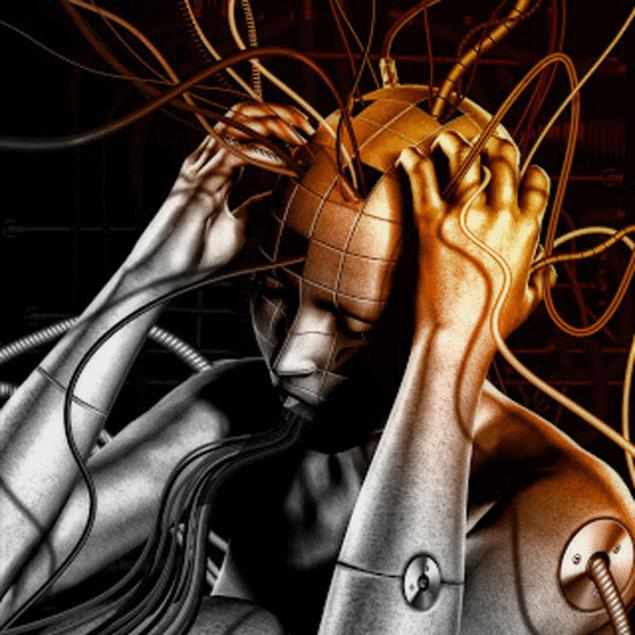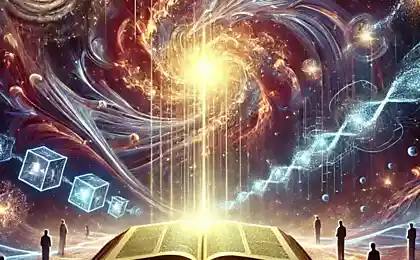203
How little we know about the world
The difference between a wise man and a scientist is that a wise man always claims to know a great deal, and a scientist usually claims to know nothing. Ask an expert in any field and he will confirm that there are fewer things he knows than there are things he doesn’t know. Humanity has always wanted to learn as much as possible, which is why there is science in the world that helps us gradually learn all the secrets of the world. However, not everything is clear to us today. Here are examples.

Why do we sleep and why do we dream? Every night, almost all people on the planet are used to sleeping and dreaming, and why this happens, researchers can not really answer. Theories, of course, are many. According to one of them, we dream to put our brain in order or to get rid of stress. Research suggests that sleep can be used as indications of what may happen to our bodies in the future, such as whether dreams are at risk for diseases such as Parkinson’s disease or dementia.
Even stranger may seem the results of research scientists from New Mexico. It turned out that trained study participants could manipulate their nightmares, thus recovering from depression. If we finally understand exactly why we dream, we can make a huge number of incredible discoveries. So far, we are far from the truth. For millions of years, we spend a third of our lives dreaming almost constantly, but we don’t know why. What happens after death? Death is another great mystery of our world. No one knows exactly what happens when our bodies stop functioning. Scientists do their best to find out, but get more questions instead. The first important issue is the state of clinical death. A huge number of people talk about seeing white light, hearing music, floating in the air, leaving their body, and much more. These experiences are not hallucinations because they occur when the brain and heart are switched off. The second question is, what happens to consciousness after physical death? According to Dr. Sam Parnia, one of the leading experts in the field of returning to life after death, people can be resurrected without lasting physical damage within 10 hours of death. This suggests that our consciousness still exists even if the body does not rise from the dead. We know very little about death, even though we have been trying to understand it for thousands of years. Why did life arise on Earth? We came a long way before we learned how to create artificial life. However, we must admit that we do not know for sure why the life that boils around us today came into being. The only thing we know is that at some point in Earth’s history, 3.8 billion years ago, molecules began exhibiting incredibly complex chemical reactions that eventually led to ribonucleic acid and eventually life. What exactly stimulated the molecules to such a reaction remains a mystery. According to one version, all this is a creation of God, according to another version, it is all the fault of ultraviolet light, but no one can answer exactly why this happened. Scientists from around the world are trying to solve this mystery and recreate the original cocktail that was on Earth, in the hope of witnessing the moment when life arose, but in vain. What are the laws of the universe? Based on our observations, we conclude that the universe is expanding, and this cannot be denied. There is also no denying that it is accelerating. According to the laws of gravity, everything should, on the contrary, slow down, preparing for the “Big compression” – the process of the reverse Big Bang, but in fact everything is somewhat different. Why is this happening? Many scientists blame dark energy and dark matter, which they believe make up most of the universe. Where this energy and matter come from is unknown. Moreover, 100% evidence of their existence does not exist. The universe lives by its own laws, and we just have to guess. We used to see history as a kind of narrative that has survived to our days. However, over time, many facts have been lost, forming huge white spots in history. Although we know a great deal about certain epochs, such as those of ancient Rome, many pages of history and even entire centuries are unknown to us, and we can only guess at some things about these pages. Take, for example, 6th century Britain. Roman influence disappeared at this time, Christianity was just beginning to develop, and Scandinavia began to gain momentum. Very little is known about this important period of history. There is only one sermon by a lunatic monk, 90% of which is devoted to divine justice. Even such great powers as Ancient Rome and Ancient Greece left far from complete information about themselves. Much of our knowledge of these times is based on unreliable sources. Discoveries come up every year. For example, recently it was discovered that the Greeks built a kind of prototype computer 2,000 years before Babbage. Why would a man need art? Ask any creative person why they paint, write, or engage in other creative activities, and you are unlikely to get any clear and understandable answer. A person is engaged in creativity, not knowing exactly why he is doing it. For example, there's no evolutionary advantage, as for a species, in having started to draw. We can only imagine why we need art. One theory is that creative expression—music, sculpture, painting, and so on—is merely the equivalent of peacock feathers, meaning that it is only necessary to attract the attention of the opposite sex and therefore to satisfy sexual needs and reproduction. Whether this is true or not is debatable, one can only guess. There are only theories and assumptions in our arsenal. We know from childhood that once upon a time on our planet lived not the creatures we are used to seeing today. We have no idea about most of them, as their fossil remains have simply not reached us for so many years. For example, a dinosaur skeleton to survive for millions of years requires a lot of difficult conditions. This means that even if we find skeletons of some species, these skeletons are not always complete. The remains of most of the creatures have not survived. For example, we have only a few bones of living creatures that lived in the Middle Triassic period, which lasted ten million years! Even if researchers manage to find large fragments of fossils, they are actually just small pieces of a larger whole. According to National Geographic, more than 59 percent of dinosaurs known to science are known solely from small fragments. Because of this scant information, scientists often make the mistake of mistaking some creatures for others. About the most famous writers of the past, whose works are known all over the world, we can not always tell much. Take, for example, William Shakespeare, one of the most readable authors, whose plays make all the theaters of the world mandatory. It is surprising that despite such a celebrity, too little is known about Shakespeare, moreover, there is an assumption that such a writer did not exist at all, and the works were written by a group of playwrights under a common pseudonym. Very little is known about the Greek poet Homer, the author of the famous Iliad and Odyssey. To be more precise, we only know that “it probably existed.” I’m also not sure if what we know today is original.
Of all Roman literature, on the other hand, only two novels have survived, and then only fragments. Many literary works were destroyed by various warriors, fires, earthquakes and so on. We have already mentioned that dark matter can explain why the universe does not obey the laws of gravity. But we forgot to mention that gravity itself does not obey its own laws. Gravity is the only one of the four fundamental forces that contradicts itself and ceases to act if the body becomes small enough. In fact, gravity is a real headache for physicists, and some argue that it does not exist at all. Every time we make an important discovery, we realize how little we know about the world. If you think of science as a house of cards, and every new breakthrough theory as a 10-ton iron ball falling on it, you will understand the essence of the problem. Around the end of the 19th century, we truly believed that we had reached the limits of knowledge. But at this time, a citizen named Einstein appeared, who published perhaps the most famous formula in history, and all ideas about the world were completely destroyed. We began to build our ideas about the world from the beginning, and everything went well until we noticed that black holes behaved completely differently than we expected. Today we are on the verge of new turns in the development of science. This means that some fundamental concepts can be redefined. For example, it is possible to “prove” with String Theory that we live in a kind of hologram that is projected from the edge of the universe. Of course, this is not the prevailing theory, but it shows how strange the truth can be. Thus, nothing makes sense, and you can be just an image that is projected from the depths of space.
Source: /users/1077

Why do we sleep and why do we dream? Every night, almost all people on the planet are used to sleeping and dreaming, and why this happens, researchers can not really answer. Theories, of course, are many. According to one of them, we dream to put our brain in order or to get rid of stress. Research suggests that sleep can be used as indications of what may happen to our bodies in the future, such as whether dreams are at risk for diseases such as Parkinson’s disease or dementia.
Even stranger may seem the results of research scientists from New Mexico. It turned out that trained study participants could manipulate their nightmares, thus recovering from depression. If we finally understand exactly why we dream, we can make a huge number of incredible discoveries. So far, we are far from the truth. For millions of years, we spend a third of our lives dreaming almost constantly, but we don’t know why. What happens after death? Death is another great mystery of our world. No one knows exactly what happens when our bodies stop functioning. Scientists do their best to find out, but get more questions instead. The first important issue is the state of clinical death. A huge number of people talk about seeing white light, hearing music, floating in the air, leaving their body, and much more. These experiences are not hallucinations because they occur when the brain and heart are switched off. The second question is, what happens to consciousness after physical death? According to Dr. Sam Parnia, one of the leading experts in the field of returning to life after death, people can be resurrected without lasting physical damage within 10 hours of death. This suggests that our consciousness still exists even if the body does not rise from the dead. We know very little about death, even though we have been trying to understand it for thousands of years. Why did life arise on Earth? We came a long way before we learned how to create artificial life. However, we must admit that we do not know for sure why the life that boils around us today came into being. The only thing we know is that at some point in Earth’s history, 3.8 billion years ago, molecules began exhibiting incredibly complex chemical reactions that eventually led to ribonucleic acid and eventually life. What exactly stimulated the molecules to such a reaction remains a mystery. According to one version, all this is a creation of God, according to another version, it is all the fault of ultraviolet light, but no one can answer exactly why this happened. Scientists from around the world are trying to solve this mystery and recreate the original cocktail that was on Earth, in the hope of witnessing the moment when life arose, but in vain. What are the laws of the universe? Based on our observations, we conclude that the universe is expanding, and this cannot be denied. There is also no denying that it is accelerating. According to the laws of gravity, everything should, on the contrary, slow down, preparing for the “Big compression” – the process of the reverse Big Bang, but in fact everything is somewhat different. Why is this happening? Many scientists blame dark energy and dark matter, which they believe make up most of the universe. Where this energy and matter come from is unknown. Moreover, 100% evidence of their existence does not exist. The universe lives by its own laws, and we just have to guess. We used to see history as a kind of narrative that has survived to our days. However, over time, many facts have been lost, forming huge white spots in history. Although we know a great deal about certain epochs, such as those of ancient Rome, many pages of history and even entire centuries are unknown to us, and we can only guess at some things about these pages. Take, for example, 6th century Britain. Roman influence disappeared at this time, Christianity was just beginning to develop, and Scandinavia began to gain momentum. Very little is known about this important period of history. There is only one sermon by a lunatic monk, 90% of which is devoted to divine justice. Even such great powers as Ancient Rome and Ancient Greece left far from complete information about themselves. Much of our knowledge of these times is based on unreliable sources. Discoveries come up every year. For example, recently it was discovered that the Greeks built a kind of prototype computer 2,000 years before Babbage. Why would a man need art? Ask any creative person why they paint, write, or engage in other creative activities, and you are unlikely to get any clear and understandable answer. A person is engaged in creativity, not knowing exactly why he is doing it. For example, there's no evolutionary advantage, as for a species, in having started to draw. We can only imagine why we need art. One theory is that creative expression—music, sculpture, painting, and so on—is merely the equivalent of peacock feathers, meaning that it is only necessary to attract the attention of the opposite sex and therefore to satisfy sexual needs and reproduction. Whether this is true or not is debatable, one can only guess. There are only theories and assumptions in our arsenal. We know from childhood that once upon a time on our planet lived not the creatures we are used to seeing today. We have no idea about most of them, as their fossil remains have simply not reached us for so many years. For example, a dinosaur skeleton to survive for millions of years requires a lot of difficult conditions. This means that even if we find skeletons of some species, these skeletons are not always complete. The remains of most of the creatures have not survived. For example, we have only a few bones of living creatures that lived in the Middle Triassic period, which lasted ten million years! Even if researchers manage to find large fragments of fossils, they are actually just small pieces of a larger whole. According to National Geographic, more than 59 percent of dinosaurs known to science are known solely from small fragments. Because of this scant information, scientists often make the mistake of mistaking some creatures for others. About the most famous writers of the past, whose works are known all over the world, we can not always tell much. Take, for example, William Shakespeare, one of the most readable authors, whose plays make all the theaters of the world mandatory. It is surprising that despite such a celebrity, too little is known about Shakespeare, moreover, there is an assumption that such a writer did not exist at all, and the works were written by a group of playwrights under a common pseudonym. Very little is known about the Greek poet Homer, the author of the famous Iliad and Odyssey. To be more precise, we only know that “it probably existed.” I’m also not sure if what we know today is original.
Of all Roman literature, on the other hand, only two novels have survived, and then only fragments. Many literary works were destroyed by various warriors, fires, earthquakes and so on. We have already mentioned that dark matter can explain why the universe does not obey the laws of gravity. But we forgot to mention that gravity itself does not obey its own laws. Gravity is the only one of the four fundamental forces that contradicts itself and ceases to act if the body becomes small enough. In fact, gravity is a real headache for physicists, and some argue that it does not exist at all. Every time we make an important discovery, we realize how little we know about the world. If you think of science as a house of cards, and every new breakthrough theory as a 10-ton iron ball falling on it, you will understand the essence of the problem. Around the end of the 19th century, we truly believed that we had reached the limits of knowledge. But at this time, a citizen named Einstein appeared, who published perhaps the most famous formula in history, and all ideas about the world were completely destroyed. We began to build our ideas about the world from the beginning, and everything went well until we noticed that black holes behaved completely differently than we expected. Today we are on the verge of new turns in the development of science. This means that some fundamental concepts can be redefined. For example, it is possible to “prove” with String Theory that we live in a kind of hologram that is projected from the edge of the universe. Of course, this is not the prevailing theory, but it shows how strange the truth can be. Thus, nothing makes sense, and you can be just an image that is projected from the depths of space.
Source: /users/1077
The most polluted street in the world is in England
The preservation and saving of natural resources in everyday life, without attachments!






















